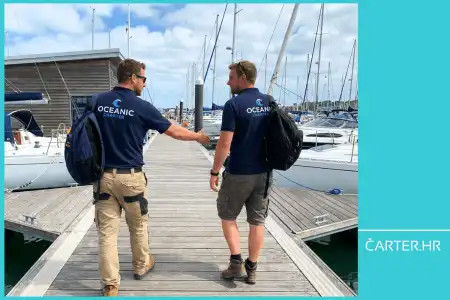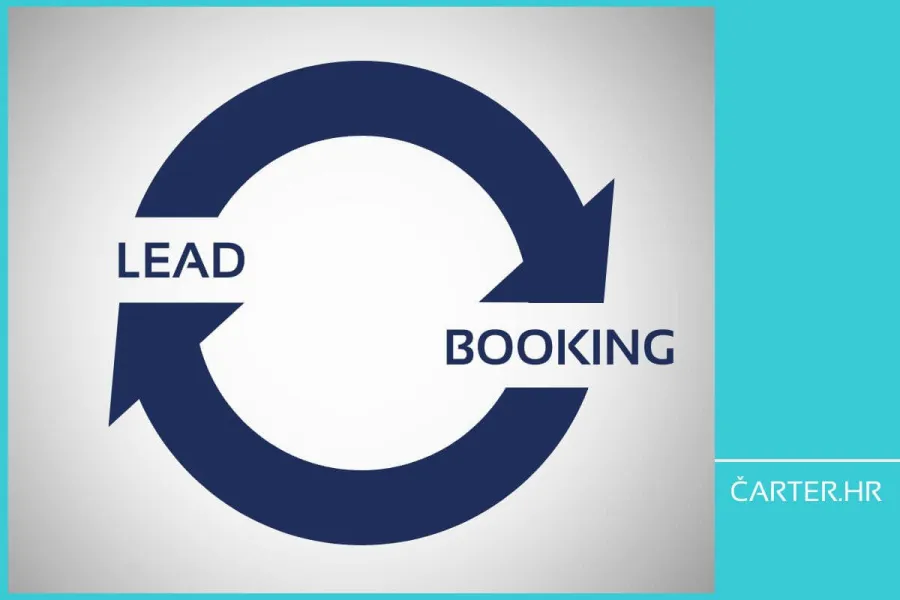
If your team often replies to inquiries only when they “find the time”, and bookings are lost because someone else was quicker, the problem might not be the number of staff, but how the entire process is set up. Here are concrete steps that help yacht charter companies run their sales more easily and efficiently.
A lead is any inquiry from a potential guest. It can be a website inquiry, a message through a platform, a call from a returning guest, or a request from an agency.
It represents the first sign of interest, but not the final booking.
The journey from lead to confirmed booking can be lengthy, and the timing and quality of your communication are crucial for success.
Guests browsing yacht charter options online are researching multiple places and sending inquiries to several companies at once.
If you don’t react fast enough, they’ll book with another charter - meaning your competition. That’s where the difference lies between a company that simply collects leads and one that knows how to turn them into bookings.
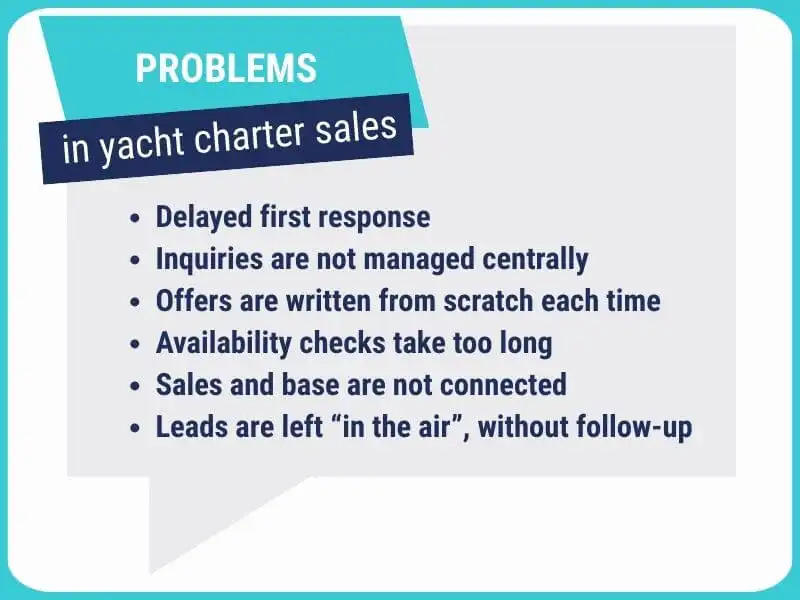
Typical problems in yacht charter sales - where it usually gets stuck
The sales process in yacht charter is not just “reply to an email and send an offer”. It’s a sequence of steps that need to be completed quickly, without downtime or repetition.
Still, sales often get stuck in the same places:
- Delayed first response
The lead arrives but remains unprocessed for 24 hours or more. By the time someone replies, the guest has already requested offers elsewhere and booked with the competition. - Inquiries are not managed centrally
Some are in personal emails, some in a spreadsheet on someone’s drive, some in a CRM that no one uses properly. There’s no clear overview of who’s handling what or what stage each inquiry is in. This creates room for mistakes and incomplete information. - Offers are written from scratch each time
Without pre-prepared templates, everyone responds “their own way”. One uses a formal tone, another is casual, someone else forgets half the info. Guests notice the inconsistency and lose trust. - Availability checks take too long
If it takes several calls, opening multiple spreadsheets and contacting the base to confirm if the date is really available - consider the lead lost. Guests don’t want to wait hours for information that could (and should) be automated. - Sales and base are not connected
Sales promises something (e.g. tender, early arrival), and the base knows nothing about it or can’t deliver. The guest arrives with expectations, and you meet them with excuses. The result: unhappy guests and unnecessary arguments within the team. - Leads are left “in the air”, without follow-up
When no one knows what stage an inquiry is in, nothing moves forward. One guest has been waiting a week for confirmation, another is asking for more info about equipment, and a third is ready to pay but still hasn’t received payment details. Everything stands still. Without a responsible person and clear records, leads get lost because no one follows through.
All these issues lead to the same outcome: wasted time, a tired team repeating the same tasks every day, and a drop in confirmed bookings. A guest who doesn’t get clear and timely communication will go to whoever offers a smoother, faster experience.
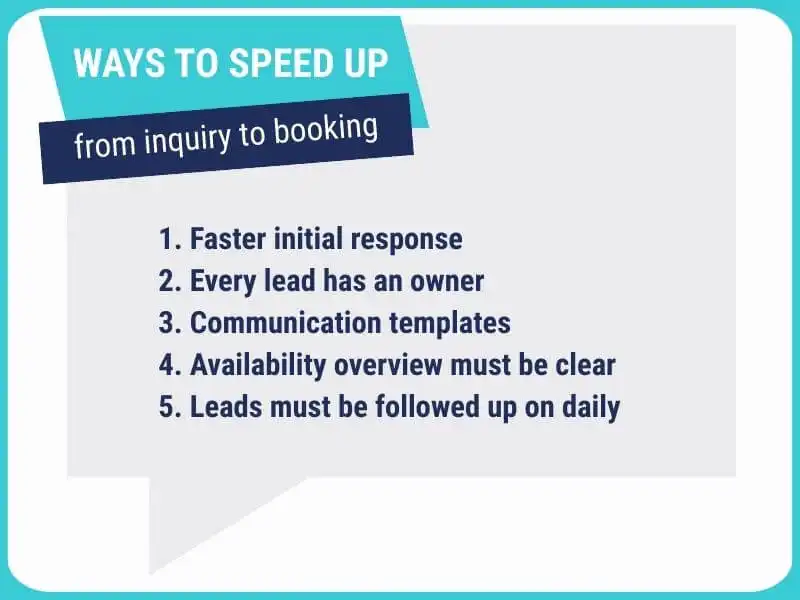
Ways to speed up the path from inquiry to booking
Most sales-related issues don’t require a full reorganization, but rather a series of smaller changes. The key is knowing where time is being wasted unnecessarily and how to fix it without adding complexity.
1. Faster initial response
Guests don’t expect a perfect PDF offer within five minutes or a full price breakdown of every option. But they do expect some sign—a reply to their inquiry—that they’ve reached the right place and that someone is working on it.
A short and simply written response like “Hello, thank you for your inquiry. We’re checking availability and will send the offer within the hour.” is enough to hold the guest’s attention. That’s the kind of message that “buys you time.”
2. Every lead has an owner
The worst-case scenario is when no one knows who is handling what. Inquiries coming to info@, answered by whoever gets to it first, can easily disappear, be forgotten, and remain unanswered.
That’s why it’s important to clearly assign who is in charge of which leads—based on language, type of vessel, region, or as agreed. If a lead (potential guest) has an owner, then there is someone who knows what was last communicated and what the next step is.
3. Communication templates
There’s no reason to write each answer to basic questions from scratch. That’s why it’s necessary to have templates for things that come up often (or daily), such as:
- how the payment process works (amounts, deadlines, currencies)
- what’s included in the price and what’s not
- check-in/check-out terms and times
- cancellation policies
Of course, every reply should be adjusted to the specific guest, but when most of the content is ready, sales can focus on what really matters - the relationship with the guest.
4. Availability overview must be clear
Excel sheets sent by email, with everyone saving a “new” version, are fertile ground for mistakes. A digital tool with a calendar, or at least a shared document with clearly defined labels (available, optioned, confirmed), is the absolute minimum the sales team must have.
5. Leads must be followed up on daily
There’s no benefit to any software, whether it’s a CRM or something simpler, if it’s not opened and used regularly.
Whether you use a CRM that stores all contacts, communication, and arrangements with guests, or an online sheet or more advanced tool, the point is the same - all information about potential guests must be recorded and easily accessible to the sales team.
Lead tracking should not be something someone does “when they have time”, but a task that is done properly every day.
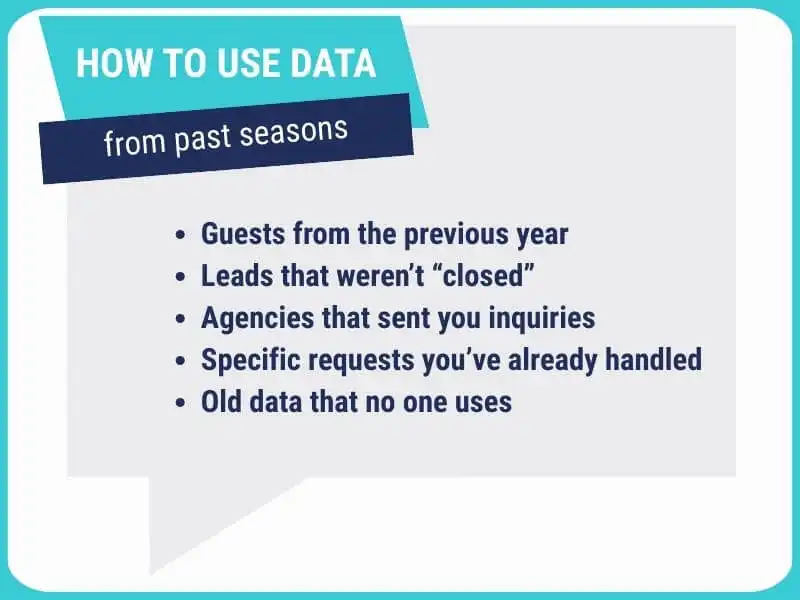
How to use data from past seasons
Real sales shouldn’t start from scratch each year.
If you run a yacht charter company, you should have data that can save time—but you need to know how to pull it and use it.
Guests from the previous year
- They often want the same date and a similar yacht.
- If you reach out to them in advance, the negotiation is shorter and there are fewer additional questions.
- You show them they haven’t been forgotten, which builds trust.
Leads that weren’t “closed”
- Some guests stopped just before payment last year, but were seriously considering booking.
- If you know what they were looking for, don’t offer something random—offer what they were already interested in.
Agencies that sent you a higher number of inquiries last year
- These contacts should be reactivated as early as January or February.
- Send them an updated fleet list, available dates, and booking terms—before they reach out to you.
- This saves time for everyone and gets sales going faster.
Specific requests you’ve already handled
- SUPs, tenders, skippers, early check-ins, organized transfers—if these were arranged last season, they don’t need to start from scratch again.
- Such details should be recorded and reused when the same guest or agency returns.
Old data that no one uses (is useless)
- An archive is only useful if it’s clear and being used.
- At the beginning of the year, it’s worth setting aside one day to analyze past leads and bookings. That might be the smartest day spent in the whole season.
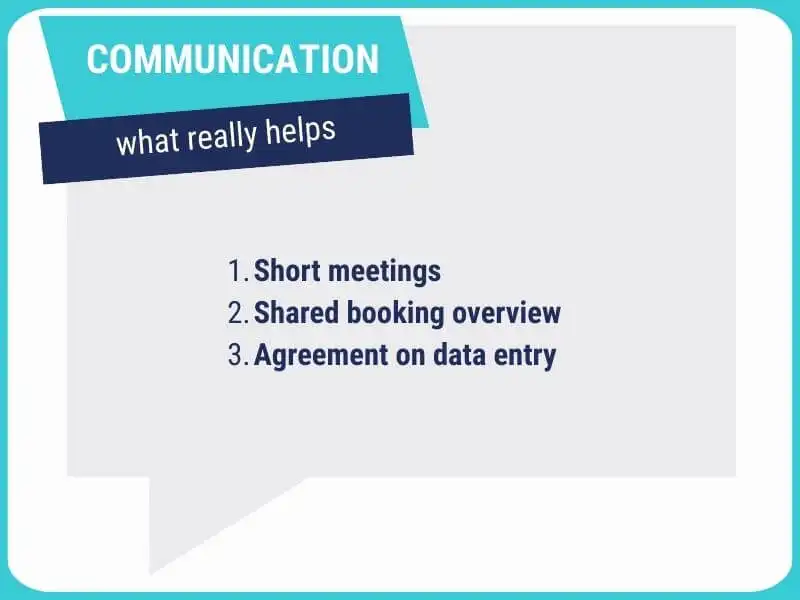
Collaboration between sales and the base
It can often seem like sales and the base are operating in two completely separate locations, even though they’re serving the same guest. One side communicates the terms, price, and expectations. The other handles yacht preparation, logistics, and real conditions on the ground.
When these two parts of the team don’t share information, mistakes happen that need to be fixed on the fly—often in front of the guest and at the last moment.
The most common situations where communication breaks down:
- Sales promises an early check-in, but the yacht hasn’t been cleaned or checked.
- The technical team replaces the anchor, dinghy, or navigation system, but sales sends out outdated specifications.
- The guest requests an extra SUP, transfer, or hostess—but the base only hears about it when the guest asks on arrival day.
In such cases, it’s not that someone doesn’t want to do the job—it’s that no one knew what was happening on the other side.
What really helps with faster and safer communication:
- Short meetings - 10 minutes on Fridays to align on who is coming, what’s specific, and what’s still missing.
- Shared booking overview - sales and base must view the same documents, in the same system, showing who is coming, what they’ve been promised, and when.
- Agreement on data entry - who enters the lead, who confirms the booking, where special requests are recorded. If everyone uses the same spreadsheet or program but still works in their own way, information gets lost again.
When everyone has access to the same data and knows exactly where to check details and what has been agreed, everything runs smoother.
There are fewer misunderstandings and fewer issues. And the guest notices that right away.
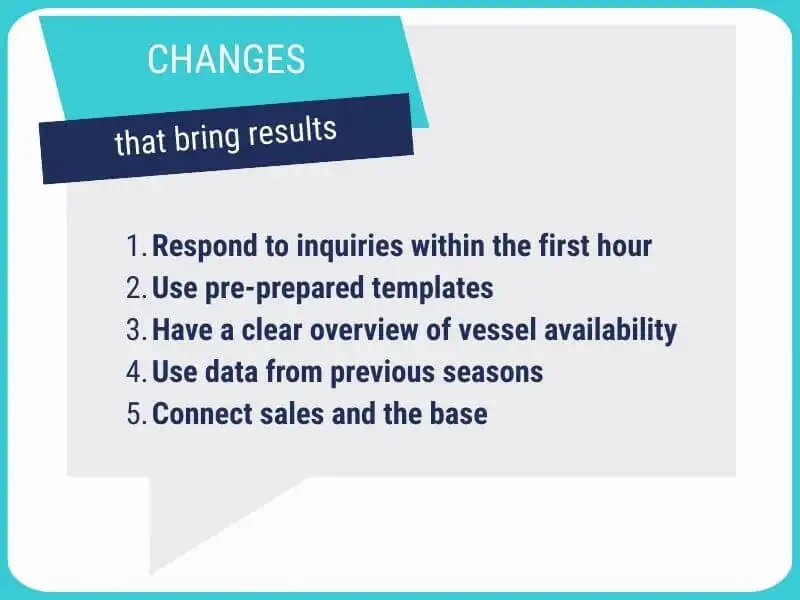
Small changes bring better results
Sales doesn’t always have to be done under pressure and rushed at the last minute.
The end of the week doesn’t have to be a race against time. The point isn’t to work more, but to work smarter. And that usually means better organization.
If you introduce a few simple steps and stick to them, the entire process from lead to booking becomes easier:
- Respond to inquiries within the first hour and clearly assign leads to the team members responsible.
- Use pre-prepared templates for communication and answers to frequently asked questions.
- Have a clear overview of vessel availability that doesn’t rely on manually maintained spreadsheets.
- Use data from previous seasons instead of starting over every year.
- Connect sales and the base so that everyone works with the same information.
Once these things become part of the routine, the time to booking shortens.
Guests receive faster and more accurate information.
And the sales team has more space to build relationships with guests and create trust that lasts longer than just one season.
If you need specific advice or want to talk about the real issues you’re facing with your leads, bookings, or communication with guests, contact us and let us know what’s bothering you.
For real-world examples and content you can immediately apply to your business, sign up for our regular newsletter.
Categories of trends
- News
- Sale
- Marketing
- SEO
- Web design
- Social media
- Technology
- Regulations
- Management
- Education
- Finances
- User experience
Newsletter
Sign up for the newsletter and receive the latest trends and tips straight to your inbox




